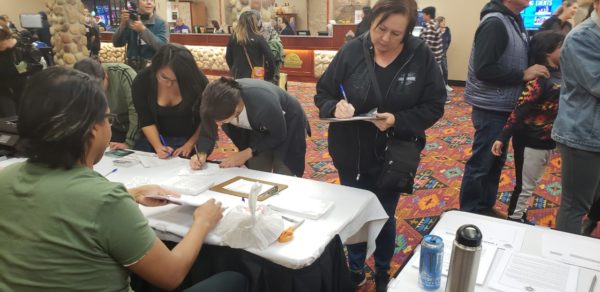
- Details
- By Native News Online Staff
BISMARCK, N.D. — A voting rights lawsuit brought by two North Dakota tribes against the state of North Dakota in 2016 is being settled.
On Friday, the Spirit Lake Nation and Standing Rock Sioux Tribe filed a binding agreement with the state of North Dakota that will allow American Indian voters without a street address to have their ballots counted. The agreement allows American Indian voters who do not have or do not know their residential street address to locate their residence on a map at the polls or when applying for an absentee ballot and be provided with their address by county officials.
The binding agreement still needs to be approved by the court. Once approved, the agreement will be enforceable by court order and will provide essential safeguards to protect American Indians’ right to vote, easing the financial and logistical burdens that North Dakota’s voter ID law placed on tribes.
The agreement with the two tribes will ensure that tribal IDs and tribally designated street addresses are deemed valid. It further will put in place commitments made by state officials in February to reimburse the tribes’ expenses incurred to produce voter IRs and to coordinate with the Department of Transportation to visit reservations prior to each election to provide access to state-issued IDs at no cost.
The Native American Rights Fund (NARF) and the Campaign Legal Center (CLC) represented the two tribes in the long legal challenge, which was consolidated with a separate suit brought by NARF in 2016.
“For the last four years, we have fought hard to protect the voice of Native voters in North Dakota. The ability to vote should never depend on home ownership or whether the government has assigned your home an address,” NARF staff attorney Matthew Campbell said. “We are relieved that North Dakota has recognized the need to hear all of its citizens’ voices, and we commend the state for taking these steps to ensure that Native American voters are able participate in the political process.”
The two lawsuits stem from the restrictive voter ID law enacted in 2013. Collectively, the two tribes have over 7,000 residents of voting age that will benefit from the consent decree, which will be in force for the statewide primary election on June 9.
More Stories Like This
Native News Weekly (August 25, 2024): D.C. BriefsDeb Haaland Rolls Out Affordability Agenda in Albuquerque
Boys & Girls Clubs and BIE MOU Signing at National Days of Advocacy
National Congress of American Indians Mourns the Passing of Former Executive Director JoAnn K. Chase
Navajo Nation Mourns the Passing of Former Vice President Rex Lee Jim
Help us defend tribal sovereignty.
At Native News Online, our mission is rooted in telling the stories that strengthen sovereignty and uplift Indigenous voices — not just at year’s end, but every single day.
Because of your generosity last year, we were able to keep our reporters on the ground in tribal communities, at national gatherings and in the halls of Congress — covering the issues that matter most to Indian Country: sovereignty, culture, education, health and economic opportunity.
That support sustained us through a tough year in 2025. Now, as we look to the year ahead, we need your help right now to ensure warrior journalism remains strong — reporting that defends tribal sovereignty, amplifies Native truth, and holds power accountable.
 The stakes couldn't be higher. Your support keeps Native voices heard, Native stories told and Native sovereignty defended.
The stakes couldn't be higher. Your support keeps Native voices heard, Native stories told and Native sovereignty defended.
Stand with Warrior Journalism today.
Levi Rickert (Potawatomi), Editor & Publisher

